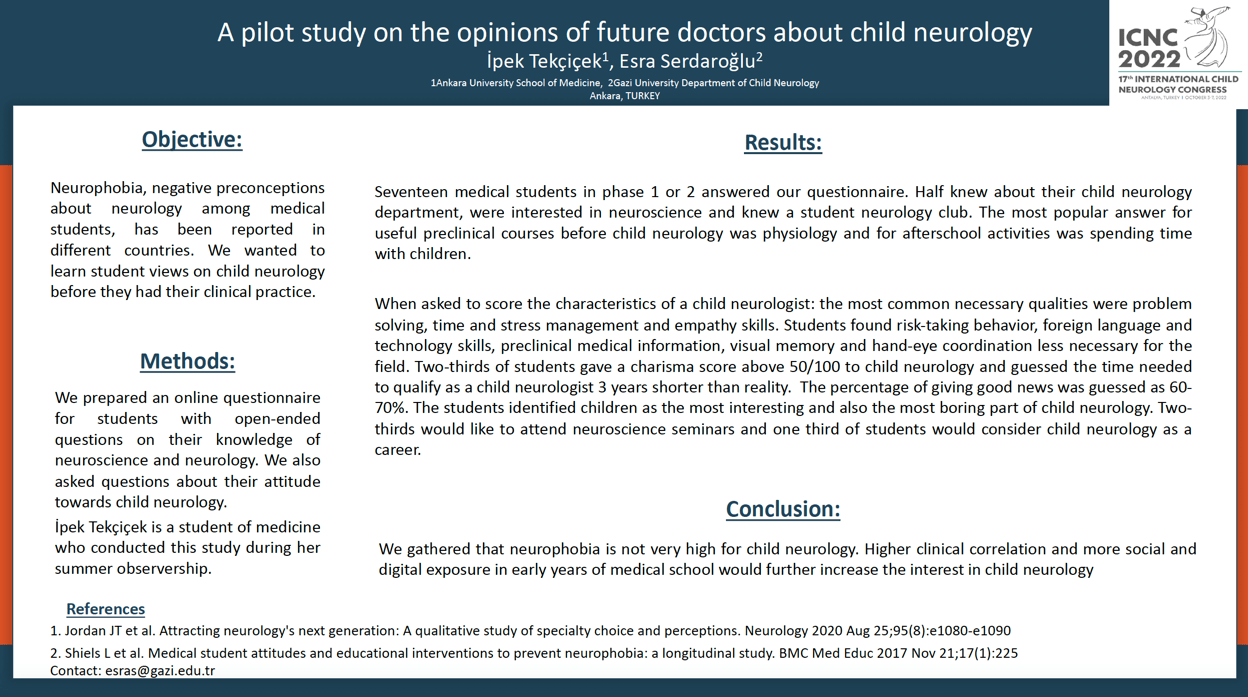A pilot study on the opinions of future doctors about child neurology
Ipek Tekcicek, Esra Serdaroglu
Objective: Neurophobia, negative preconceptions about neurology among medical students, has been reported in different countries. We wanted to learn student views on child neurology. Methods: We prepared a questionnaire for students with open-ended questions on their knowledge of and attitude towards child neurology. Results: Seventeen medical students in phase 1 or 2 answered our questionnaire. Half knew about their child neurology department, were interested in neuroscience and knew a student neurology club. The most popular answer for useful preclinical courses before child neurology was physiology and for afterschool activities was spending time with children. The students identified children as the most interesting and also the most boring part of child neurology. When asked to score the characteristics of a child neurologist: the most common necessary qualities were problem solving, time and stress management and empathy skills. Students found risk-taking behavior, foreign language and technology skills, preclinical medical information, visual memory and hand-eye coordination less necessary for the field. Two-thirds of students gave a charisma score above 50/100 to child neurology and guessed the time needed to qualify as a child neurologist 3 years shorter than reality. The percentage of giving good news was guessed as 60-70%. Two-thirds would like to attend neuroscience seminars and one third of students would consider child neurology as a career. Conclusion: We gathered that neurophobia is not very high for child neurology. Higher clinical correlation and more social and digital exposure in early years of medical school would further increase the interest in child neurology.
Keywords: medical student, medicine, child neurology, specialty, neurophobia
Ipek Tekcicek
Ankara University
Turkey
Esra Serdaroglu
Gazi University
Objective: Neurophobia, negative preconceptions about neurology among medical students, has been reported in different countries. We wanted to learn student views on child neurology. Methods: We prepared a questionnaire for students with open-ended questions on their knowledge of and attitude towards child neurology. Results: Seventeen medical students in phase 1 or 2 answered our questionnaire. Half knew about their child neurology department, were interested in neuroscience and knew a student neurology club. The most popular answer for useful preclinical courses before child neurology was physiology and for afterschool activities was spending time with children. The students identified children as the most interesting and also the most boring part of child neurology. When asked to score the characteristics of a child neurologist: the most common necessary qualities were problem solving, time and stress management and empathy skills. Students found risk-taking behavior, foreign language and technology skills, preclinical medical information, visual memory and hand-eye coordination less necessary for the field. Two-thirds of students gave a charisma score above 50/100 to child neurology and guessed the time needed to qualify as a child neurologist 3 years shorter than reality. The percentage of giving good news was guessed as 60-70%. Two-thirds would like to attend neuroscience seminars and one third of students would consider child neurology as a career. Conclusion: We gathered that neurophobia is not very high for child neurology. Higher clinical correlation and more social and digital exposure in early years of medical school would further increase the interest in child neurology.
Keywords: medical student, medicine, child neurology, specialty, neurophobia
Ipek Tekcicek
Ankara University
Turkey
Esra Serdaroglu
Gazi University

Ipek Tekcicek
Ankara University Turkey
Ankara University Turkey